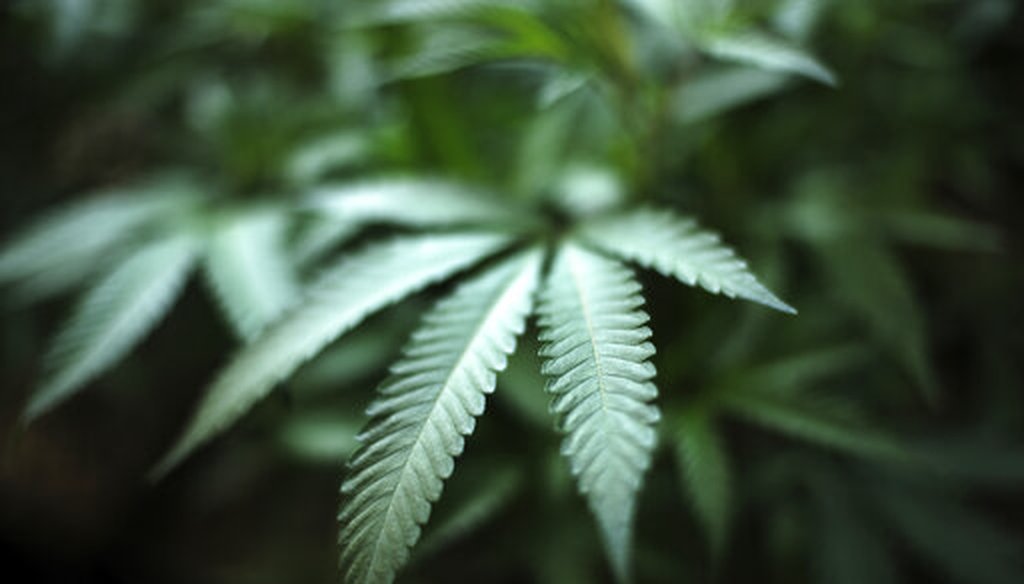Stand up for the facts!
Our only agenda is to publish the truth so you can be an informed participant in democracy.
We need your help.
I would like to contribute

Marijuana grows at an indoor cannabis farm in Gardena, Calif. (AP/Vogel)
In the weeks since the attacks in Texas and Ohio, politicians and pundits have pointed the blame for mass shootings in several different directions.
Some called out current gun laws. Some faulted white supremacy or President Donald Trump’s rhetoric on immigrants. Others blamed video games or prescription drugs.
Fox News talk show host Tucker Carlson has a new hypothesis to explain why people to commit acts of extreme violence: marijuana.
During an Aug. 27 interview with former New York Times reporter Alex Berenson, Carlson noted that the Dayton, Ohio, shooter had cocaine, Xanax and alcohol in his system when he attacked.
"He was also known to be a long-time user of marijuana," Carlson said. "It turns out, in fact, that many violent individuals have been avid marijuana users. Is there a connection?"
Berenson replied that that marijuana and violence are indeed linked, because cannabis can cause the onset of psychosis, which can in turn lead to violence. That’s the finding at the heart of his new book, "Tell Your Children: The Truth About Marijuana, Mental Illness, and Violence."
"So, I don't think it's going way out on a limb to draw the connection then between cannabis use, particularly I assume chronic use, and acts of violence," Carlson responded. "Why is this not something that we're pursuing more aggressively?"
In the past, we’ve debunked claims that mass shootings could be fueled by psychiatric drugs or Ritalin, a prescription for attention deficit hyperactivity disorder. We also rated a 2014 claim that people on pot "shoot each other ... stab each other ... strangle each other, drive under the influence, kill families" as Mostly False.
From talking to experts, we found that Berenson’s book goes far beyond what the available science actually shows. Carlson offered no pushback as he praised Berenson for being "a voice in the wilderness," giving viewers the wrong impression about a cannabis link to violence.
The reality is that there’s no scientific consensus.
In a statement to PolitiFact, a Fox News spokesperson said Carlson’s segment was inspired by a New York Post op-ed that said an anti-pot lobby group had compiled a list of mass shooters it claimed were avid marijuana users, including Dayton shooter Connor Betts, Aurora, Colo., shooter James Holmes, Tucson, Ariz., shooter Jared Loughner and Chattanooga, Tenn., shooter Mohammad Abdulazeez.
The spokesperson also pointed to a July study from British and Dutch researchers that found daily use of marijuana — compared with nondaily use or no use — increased the likelihood of violence for people with psychotic disorders such as schizophrenia.
But that doesn’t mean casual pot smokers will necessarily turn violent.
"This is absolute nonsense," said Katherine Newman, interim chancellor at the University of Massachusetts, Boston and the author of a book on school shootings. "There is no link whatsoever between marijuana and extreme violence."
Other experts told us there simply isn’t enough of a scientific consensus to draw Berenson’s conclusions.
The central premise of Berenson’s book — which argues against cannabis legalization — is summed up in these three lines: "Marijuana causes psychosis. Psychosis causes violence. The obvious implication is that marijuana causes violence."
But the book has been a source of controversy since it was published in January. A public letter signed by 100 scholars and clinicians refuted some of its central findings and accused Berenson of cherry-picking data and presenting correlation as causation.
Berenson relied primarily on two studies to connect pot and psychosis, including one 1987 study from a researcher who told Berenson that "cannabis is responsible for between 10% and 15% of schizophrenia cases." (This specific finding came not from the study itself, but from Berenson's interview with its author.)
The other is a 2017 study from the National Academies of Sciences, Engineering and Medicine that found "cannabis use is likely to increase the risk of developing schizophrenia and other psychoses." But it was not as definitive as Berenson made it out to be.
UCLA's Ziva Cooper, one of the study’s board members, disputed Berenson’s characterization of its findings, writing on Twitter that it "did not conclude that cannabis causes schizophrenia" but rather found an association between the two.
On the connection between marijuana and violence, Berenson pointed to anecdotes and data showing that the first four states to legalize pot — Alaska, Colorado, Oregon and Washington — saw increases in murders and aggravated assaults after 2014.
But critics said he cherry-picked that data, since Washington and Colorado legalized marijuana in 2012, not 2014, and there was a national uptick in homicides in 2015.
Benjamin Hansen, professor of economics at Oregon University, built a model to estimate what the murder rates in Colorado and Washington would have looked like had pot not become legal.
"The homicide rates in Colorado and Washington were actually below what the data predicted they would have been given the trends in homicides from 2000-2012," he wrote in a blog post.
In fact, other data could tell a much different story.
"Cannabis consumption, and especially heavy cannabis consumption, has been on the rise since 1992," Mark Kleiman, a professor of public policy at New York University Wagner, told New York Magazine. "Over that period, national homicide rates have fallen more than 50%."
Plus, for every study that’s declared a link between pot and violence, there are others that say the opposite. A 2013 Rand Corporation study commissioned by the federal government found that "marijuana use does not induce violent crime, and the links between marijuana use and property crime are thin."
As we noted in 2014, there is bound to be some overlap between people who commit violent acts and people who smoke marijuana because of how popular marijuana is. According to the United Nations, 192 million people worldwide used marijuana at least once in 2016.
While marijuana does have some health consequences, a turn toward violence is not widely accepted as one of them.
Behavioral sciences and drug policy experts told us it’s widely accepted that marijuana and psychosis are linked.
But there’s disagreement over which comes first — the marijuana use or the psychosis — and whether one causes the other.
People with psychotic illnesses are more likely to use pot, but that could be because they tend to turn to it in an effort to self-medicate, said Hansen, the Oregon University economist.
Even if causality could be assigned, it’s also not clear from the available studies whether the drug unmasks psychotic symptoms in predisposed people or whether it triggers the onset of psychosis entirely, said James Knoll, director of forensic psychiatry at Syracuse University.
The bottom line is that, without being able to legally administer marijuana in a controlled laboratory setting, researchers can’t tell whether its use causes psychosis.
"In terms of whether using cannabis causes the development of psychotic disorders, there is no consensus," said Matthew Johnson, associate professor of psychiatry and behavioral sciences at Johns Hopkins University. "The definitive studies have yet to be run."
For the same reasons, experts are skeptical about the supposed connection between marijuana and violence.
"Marijuana use is higher in young men, people with serious adverse childhood experiences, antisocial personality, low income, low education, use of other illicit substances," Knoll said. "All of these are well known risk factors for violence in their own right."
So yes, many mass shooters have proven to be marijuana users, experts said. But that doesn’t mean pot made them pull the trigger.
"Cannabis use is common overall, but it is most concentrated in groups with high rates of violence," said Jonathan Caulkins, professor of operations research and public policy at Carnegie Mellon University. "So absolutely many people who commit violent acts have been heavy cannabis users. The only argument is whether the association is causal."
If anything, marijuana’s popularity should make a supposed connection to violence easier to spot, Knoll said. "If there was a clear or strong link, one would expect it to be more pronounced than we are finding."
Clarification, Sept. 5, 2019: This report has been updated to reflect that information about the connection between marijuana and psychosis came from Berenson's interview with the author of the 1987 study, not the study itself.
Our Sources
Fox News, "Tucker Carlson Tonight — Tuesday, August 27," Aug. 27, 2019
Media Matters for America, "Tucker Carlson suggests link between mass shootings and marijuana use," Aug. 27, 2019
The New York Times, "What Advocates of Legalizing Pot Don’t Want You to Know," Jan. 4, 2019
The Wall Street Journal, "Marijuana Is More Dangerous Than You Think," Jan. 4, 2019
The New York Post, "The link between pot and mass shootings may be closer than we think," Aug. 7, 2019
The New York Post, "Massacre suspect trolled Web for sex," July 21, 2012
LA Weekly, "Marijuana: Tucson Massacre Suspect Jared Loughner Was ‘Habitual’ Pot User," Jan. 11, 2011
NBC News, "Chattanooga Shooter Mohammad Abdulazeez Had History of Drug Abuse, Family Says," July 20, 2015
Cambridge University Press, "Use of illicit substances and violent behaviour in psychotic disorders: two nationwide case-control studies and meta-analyses," July 30, 2019
Drug Policy Alliance, "Letter from Scholars and Clinicians who Oppose Junk Science about Marijuana," Feb. 14, 2019
Ziva Cooper on Twitter, Jan. 9, 2019
Aaron Carroll on Twitter, Jan. 8, 2019
Beau Kilmer on Twitter, Jan. 7, 2019
United Nations Office of Drugs and Crime, "Analysis of Drug Markets: Opiates, cocaine, cannabis, synthetic drugs," 2018
The National Academies of Sciences, Engineering and Medicine, "The Health Effects of Cannabis and Cannabinoids," Jan. 12, 2017
Karolinska Institutet, "Cannabis and schizophrenia. A longitudinal study of Swedish conscripts," Dec. 26, 1987
Rand Corporation, "Improving the Measurement of Drug-Related Crime," 2013
Centers for Disease Prevention and Control, "Marijuana and Public Health," Feb. 27, 2018
Vox, "What Alex Berenson’s new book gets wrong about marijuana, psychosis, and violence," Jan. 14, 2019
Vice, "All the Things the New Anti-Weed Crusade Gets Horribly Wrong," Jan. 14, 2019
New York Magazine, "Did Marijuana Legalization Really Increase Homicide Rates?" Jan. 7, 2019
Reason, "Does Legalizing Marijuana Cause 'Sharp Increases in Murders and Aggravated Assaults'?" Jan. 1, 2019
The Nation, "What Fearmongering About Pot Tells You About Mainstream Marijuana Coverage," Jan. 28, 2019
The Guardian, "Does marijuana use really cause psychotic disorders?" Jan. 20, 2019
The Guardian, "Popular book on marijuana's apparent dangers is pure alarmism, experts say," Feb. 17, 2019
The Incidental Economist, "A more thorough analysis of marijuana use and homicide in Colorado and Washington," Jan. 8, 2019
PolitiFact, "What’s behind the dubious claim that psychiatric drugs fuel mass shootings?" Aug. 16, 2019
PolitiFact, "No links between Ritalin and school shootings, as NRA's Oliver North claimed," May 22, 2018
PolitiFact, "The facts on mass shootings, guns in the United States," May 18, 2018
PolitiFact, "Nancy Grace says pot users ‘shoot each other’ and ‘kill families,’" Jan. 24, 2014
Email interview with Katherine Newman, interim chancellor at the University of Massachusetts, Boston and the author of "Rampage: The Social Roots of School Shootings," Aug. 29, 2019
Email interview with Benjamin Hansen, professor of economics at Oregon University, Aug. 29, 2019
Email interview with Michael Rocque, associate professor of sociology at Bates College, Aug. 29, 2019
Email interview with Jonathan Caulkins, professor of operations research and public policy at Carnegie Mellon University, Aug. 29, 2019
Email interview with James Knoll, director of forensic psychiatry at Syracuse University, Aug. 29, 2019
Email interview with Matthew Johnson, associate professor of psychiatry and behavioral sciences at Johns Hopkins University, Aug. 29, 2019
Statement from Fox News, Aug. 29, 2019
































